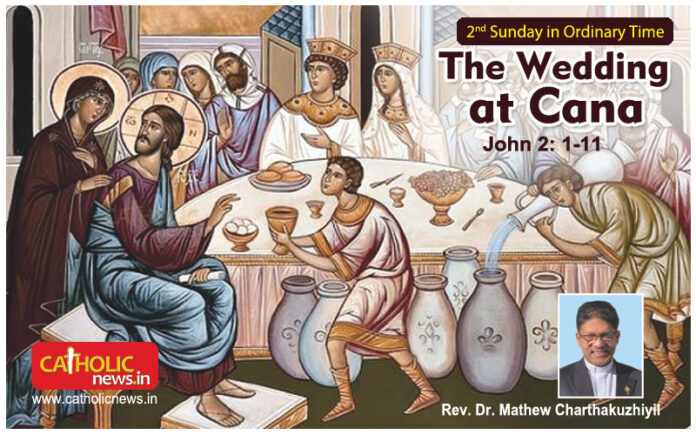
The Gospel describes beautifully the first miracle of Jesus – the transformation of water into wine at the wedding in Cana. This was a moment of potential embarrassment for the family when they ran out of wine, but it became an occasion for revealing God’s abundant blessings. This passage speaks profoundly about what happens in our life when Jesus is present.
Jesus performs a miracle that transforms ordinary water into the finest wine, something that goes beyond what was expected. The wedding hosts had already run out of wine, an embarrassing situation in Jewish culture, but Jesus transformed this material shortage into an abundant blessing. He doesn’t just create a small quantity of wine, but an overwhelming amount, about 180 gallons in total. This act signifies more than just meeting a physical need; it points to the generosity and the richness of God’s love.
Jesus’ presence at the wedding in Cana is no accident. He was there to bless and sanctify the joy of this gathering, and through his action, he elevated the occasion into something sacred. The guests at the wedding were unaware of the miracle taking place right before them, but the servants, those who were willing to listen to Jesus and follow his instructions, were the ones who experienced the fullness of his grace.
We can draw many lessons from this simple yet profound event. First, we learn that Jesus is present in the ordinary events of our lives. Often, we seek God in the grand moments, in times of crisis, or places of profound spiritual experience. But the miracle at Cana shows us that God is present in the ordinary, in the celebrations, and in the seemingly insignificant moments of life. His presence transforms them into something more beautiful, more meaningful. Jesus doesn’t just wait for the perfect moment to act; he steps into the midst of everyday life, bringing his grace, even when we may not recognize it.
Second, the miracle at Cana reveals the importance of the intercession of Mary. When the wine runs out, it is Mary who turns to Jesus, saying: “They have no wine.” Mary does not dictate how the miracle should happen, but she simply brings the situation before Jesus. Her role at this moment is to bring the needs of the people to the Lord, trusting that he will respond. In our own lives, we too can turn to Mary, asking for her intercession in our times of need, trusting in her maternal care and her closeness to her Son.
Finally, the transformation of water into wine is not just a mere act of meeting a need; it is an expression of God’s lavish generosity. He doesn’t provide just enough; he provides more than enough. This is a reflection of the nature of God’s love for us – a love that is never limited, never withholding, but always overflowing. God desires to pour out his blessings upon us, sometimes in ways we don’t expect, and often in ways we fail to notice. We are called to open our hearts to the fullness of God’s love, not just in the big moments of our lives but in the small and ordinary.
Dear friends, the wedding at Cana invites us to reflect on the abundance of blessings that come from having Jesus in our lives. Let us, like Mary, bring our needs to Jesus with faith. Let us, like the servants, obey him with trust. And let us, like the disciples, believe in him as we witness the signs of his presence in our lives.
Rev. Dr. Mathew Charthakuzhiyil



